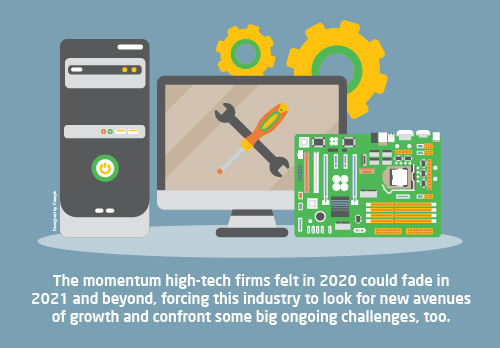The COVID-19 pandemic has had an uneven impact on the high-tech industry. Compared to firms in other sectors such retail, the manufacturers of semiconductors, PCs, network equipment and related assets saw a much quicker rebound in demand for their products throughout 2020. IDC estimated that PC shipments climbed 13% year-over-year in 2020, the fastest growth in a decade. Likewise, the semiconductor market saw its strongest quarterly growth since 2016. The sudden uptick in work from home as well as the broader shift of consumer spending away from services and experiences toward durable goods helped buoy this growth.
But that momentum could fade in 2021 and beyond, forcing high-tech firms to look for new avenues of growth and confront some big ongoing challenges, too. Let’s look at some of the key current trends.

The Great Supply Chain Uncoupling
Arguably no industry is as reliant on China — for both supply and demand — as high-tech is. In the past, companies would often have most or all of their manufacturing within Greater China. This region has also accounted for a rapidly growing share of high-tech purchases. But the combined effects of rising costs and trade tensions have spurred many organizations to relocate their supply chains. For example, according to the Financial Times, one major Taiwanese server manufacturer recently moved its operations back home and to the U.S. and Mexico.
We should expect more of the same in the years ahead as firms seek cost efficiencies, redundancy and other assurances. Supply chains will become less concentrated within China, but companies will still seek to balance their reservations about overreliance on China operations with their need to sell to consumers there, per a Bain analysis.
Cloud Transformation Becomes Realistic
In addition to such relocation and diversification, upgrading to cloud-based systems is one of the most reliable steps toward a more robust high-tech supply chain. But supply chain management (SCM) in the cloud has only recently achieved real momentum. Companies that still rely on on-premises IT infrastructure often struggle to keep up with rapid changes in the marketplace and also scale their operations, all while shouldering relatively high maintenance and opportunity costs. As more of them look to modernize and future-proof their operations, they’re flocking to cloud SCM.
Gartner estimates that cloud SCM growth began to outpace traditional licensed alternatives in 2019 and that in 2020 it accounted for 90% of all SCM spending. Inspirage has guided the cloud transition for customers like Cohu, which brought together all of its operations in one convenient, scalable cloud-based platform.

Machine Learning Throughout the Supply Chain
Machine learning (ML) and artificial intelligence (AI) can both help detect issues within supply chains before they become unmanageable. For example, ML and AI may enable automated analysis of products for common defects, speeding up time to remediation. The growth of edge computing, which puts processing power for ML and AI closer to the devices actually gathering raw data, is embedding these types of insights deeper into supply chain operations. Supply chains could become more efficient and cost-effective over the long term due to ML and AI enhancements.
Inspirage’s team of supply chain experts can help your company find its way toward more sustainable operations. Connect with us directly to learn more.